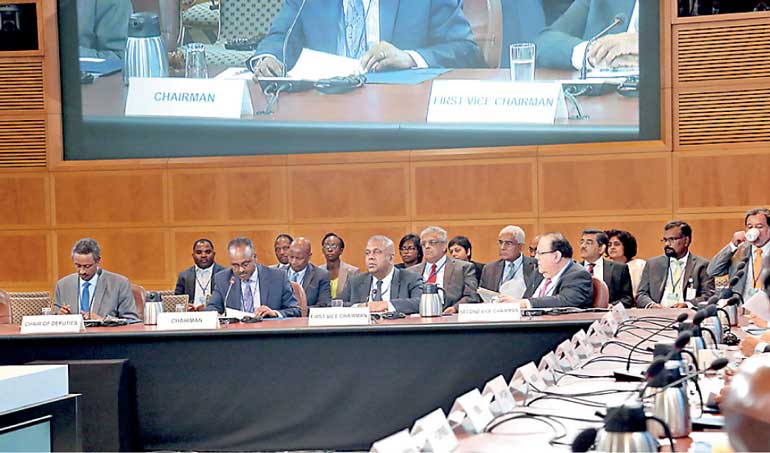Tuesday Feb 17, 2026
Tuesday Feb 17, 2026
Monday, 16 October 2017 01:13 - - {{hitsCtrl.values.hits}}

By Uditha Jayasinghe in Washington
As global growth braces for possible headwinds from protectionism, Sri Lanka has firmly committed to stronger multilateral cooperation, greater space for developing countries in the decision-making process of multilateral organisations and concessionary funding to achieve sustainable development.
Finance Minister Mangala Samaraweera, delivering a statement at the International Monetary Fund (IMF) and World Bank Annual General Meetings in Washington on Friday, underscored the development priorities of the Government by highlighting the need for greater equitable engagement between multilateral development organisations and developing countries such as Sri Lanka.
The meetings were held in the backdrop of the US embarking on the renegotiation of the North American Free Trade Agreement (NAFTA), which also includes Mexico and Canada. US President Donald Trump also announced a withdrawal of the US from UNESCO last week and his administration called for the World Bank to limit its funding to China if it wants to see an increase in funding from America. Brexit was also discussed at the IMF meetings as negotiations between London and Brussels over a potential trade deal became deadlocked with IMF Managing Director Christine Lagarde saying that a UK exit from the European Union without a trade agreement would be “unimaginable.”
Sri Lanka, however, remained optimistic of an upswing in global growth, which is expected to be 3.6% for 2017, the best in a decade as well as robust development in Asia.
“The global economy continues its recovery. The relatively favourable growth performance offers an opportunity to effectively tackle key challenges to the global economy. This requires adapting the multilateral system to the changing global economy through active dialogue and cooperation among the international community while addressing valid country specific concerns and ensuring mutual benefits,” Samaraweera said.
“In the context of the IMF, we look forward to the completion of the 15th General Review of Quotas and a new formula that further shifts quota shares to emerging market and developing economies to reflect the new realities in the global economy.”
Sri Lanka’s growth model will be private sector-driven with exports and Foreign Direct Investment (FDI) as key pillars, supported by technological advancement and innovation, he added.
“In this process, we are committed to improve human capital and skills, set up globally recognised regulatory mechanisms and investment practices, in addition to the improvement of physical infrastructure, and create the best possible enabling environment for Sri Lanka to attract more businesses, trade and investment to become a higher income country.”
“We will continue to work with the UN and other institutions by aligning the Government’s policy strategy with the ‘Sustainable Development Goals (SDGs) and Targets’ to be achieved by 2030. We have introduced three well thought out frameworks to manage the country’s fiscal policy, monetary policy and foreign exchange operations to ensure sound macroeconomic policies.”
Structural reforms including revamping state-owned enterprises will be done to ensure efficient management and strengthen financial viability, Samaraweera assured.
The Finance Minister expressed confidence the World Bank’s latest lending program for Sri Lanka would enhance its role in the country’s development and assist to reduce income disparities as well as increase female participation in the economy.
“In order to achieve the desired objectives however, it is essential that more concessionary financial assistance through innovative financial tools and products from international financial institutions is available to develop the infrastructure facilities of the lagging regions and also to provide basic needs such as health, education and sanitary facilities.”
“We strongly believe these are essential ingredients for development with reconciliation.”
His view was backed by Central Bank Governor Dr. Indrajit Coomaraswamy, who acknowledged that developing countries had to forge their own trade channels in a world where sweeping transnational trade deals had become non-existent.
“We have already seen protectionist tendencies emerge and clearly if they are to advance there would be a lose-lose situation as growth prospects would be significantly jeopardised. We have seen the rise of regional blocs and bilateral trade agreements, which are essentially second best solutions. So what countries are doing now is cutting deals with their neighbours and important trading partners,” he told reporters at a G24 media briefing in Washington.
“Sri Lanka’s perspective has been to deepen and widen its existing trade agreements and negotiate new ones. I don’t think for the moment multilateral trade negotiations will move forward. Given all that I think it is now up to countries to create as much space as they can in terms of increasing market access through a mixture of bilateral, regional and plurilateral agreements.”